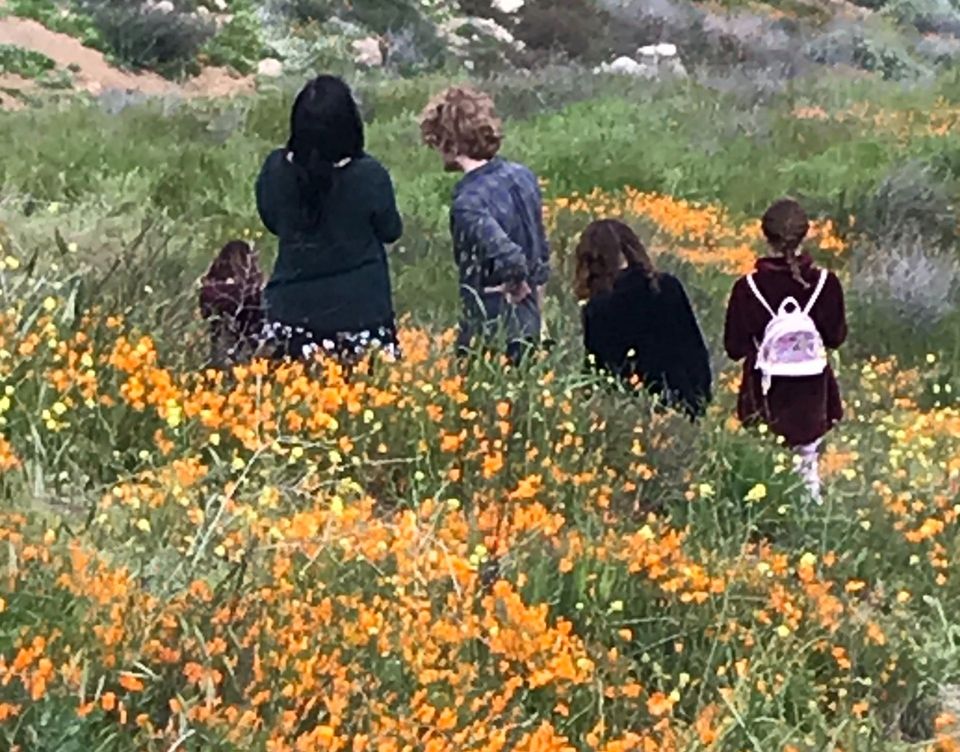Are We Climate Change Deniers By (De)fault?
“It is human action that will determine the climate of the future, not systems beyond our control”. - David Wallace-Wells, Uninhabitable Earth
Recently, my husband and I drove down from L.A. to Walker Canyon near Lake Elsinore to see the California poppy super bloom. Parking was a nightmare. Apparently, hundreds of other people had the same idea. Climbing into the canyon we enjoyed many pleasant encounters. We joked and laughedwith other visitorson this lovely afternoon. It would have been a moment of bliss, were it not for the disturbing views that unfolded on our way back to the car.
Destroying what
they'd come to admire the visitors looked carefree...
Despite the park’s website urging visitors to stay on the trails, clusters of people dotted the flowers everywhere. Crushed poppies bore evidence of trampled paths plowed crisscross through the fragile blooms. Destroying what they'd come to admire the visitors appeared carefree, all happily wrapped up in themselves.
When we got back to our car and the door slammed shut, I noticed how perturbed I was by the destruction and carelessness. Wasn’t it ironic that this explosion of color as the result of the extraordinary rainfalls of this winter, had put climate change into the headlines and surely on everybody’s radar and yet many didn't connect the dots. Apparently, it all registered merely as unusual weather patterns entirely separate from their daily lives, needs and desires.
Global warming is elective
...
I had just finished reading: “Uninhabitable Earth” by David Wallace-Wells, a shocking compilation of data and predictions painting a dismal picture of our future with climate change. At that moment the pieces of the tragedy came together, and especially our part in it. “We have to come to understand", he writes, "that global warming is elective", and that "we must embrace our responsibility as it sits in front of us as clearly as a stirring wheel .”
Ouch! Why didn’t I catch it when it was literally staring me in the face? Without thinking about it we, too, had made the trip thereby putting ever more carbon emissions in the air. That's when it hit me: Was it possible that we were all climate change deniers - if not by conviction but by default?
Meanwhile, the news came that the park had closed due to the abusive crowds, at least temporarily. For me, however, the issue was far from solved. Unable to go back in time, the question was how to move forward. What would we do next time when our plans collided with climate change?
You might argue that I’m overly dramatic: That connecting with nature is as much essential to our health as is clean air. Or that there are more pressing issues like greenhouse gases. Or that you don't consider trampling a few poppies in light of the bigger crisis such a big deal. Or maybe you only care about yourself, like some friends have nonchalantly admitted, because all they want is to have fun - after them the flood. Really?
"We can be blind to
the obvious and also blind to our blindness.”
Still sitting in the parked car, I turned to my husband, “Do you think it’s possible to believe in global warming and not “elect” to take action?” We concluded that it was. So much of what we do is reflex and autopilot. Daniel Kahneman argues in his book “Thinking Fast and Slow” that we can be “blind to the obvious and also blind to our blindness”.
But if we believe what science tells us, that all we have are 30 years to get our act together, it seems to me the big hurdle now is whether we’re willing to assume immediate responsibility, in other words whether we’re willing and able to reprogram ourpersonalautopilots to acknowledge an urgency that makes even an insignificant afternoon outing NOT TAKEN, a meaningful piece in the climate puzzle.
“We must all share in the responsibility... it is thinking like a people - one people whose fate is shared by all" , insistsWallace-Wells
I'm beginning to sense that he’s right. So for me, the bigger question has become, whether I truly believe that my individual impact, no matter how big or small, contributes to every hurricane, tornado, atmospheric river storm, flood or wildfire I hear about on the news - if only because our actions all add up. On our way home we mused what changes we would make to assume “our” responsibility. After all, we are all connected to each other and also to every thing.

